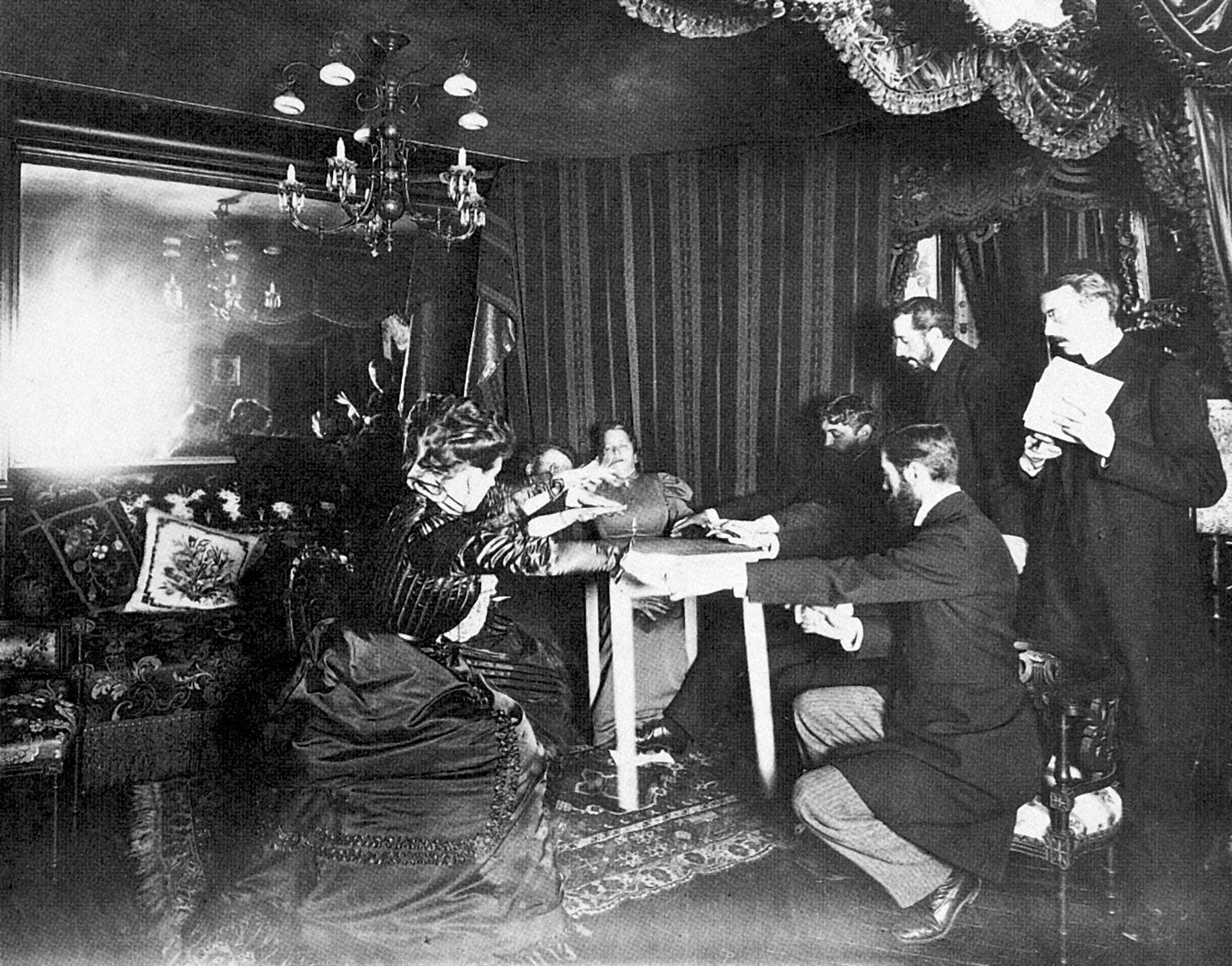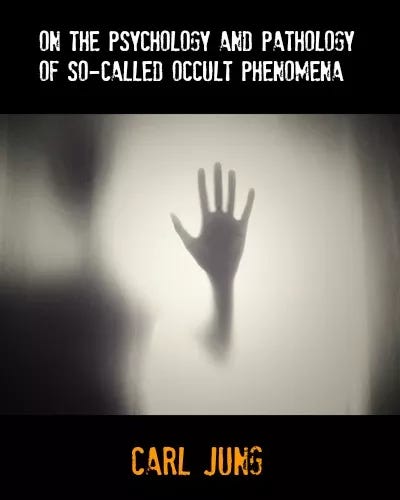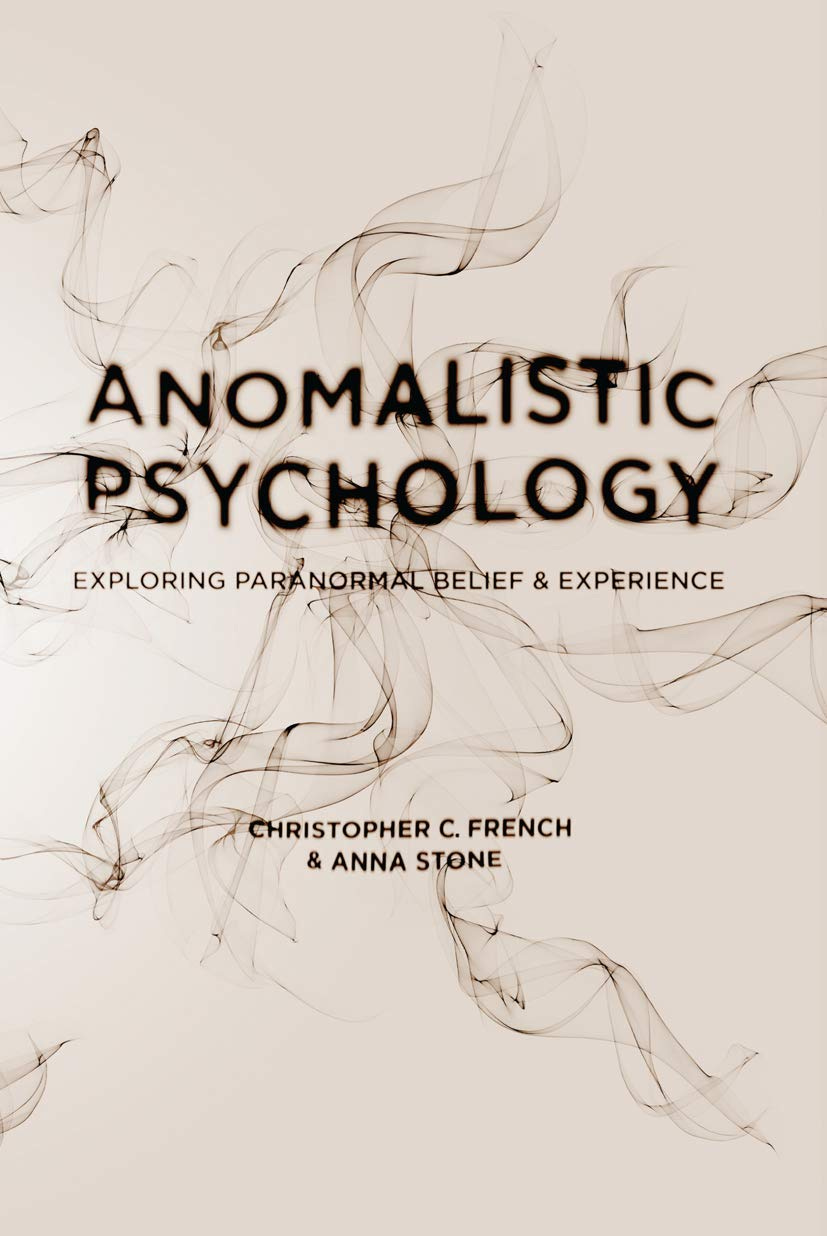Halloween Newsletter
Ouija Boards. Studying the Paranormal. Anomalistic Psychology. Did You Know? Spooky Optical Illusion Art.
🎃 A very spooky welcome to this Halloween edition of the All About Psychology newsletter—the official newsletter of All-About-Psychology.com, a website providing comprehensive information and resources for psychology students and educators since 2008.
Do Ouija Boards Really Work? Three Psychological Factors at Play 👻
Halloween is the perfect time to delve into the mystery of Ouija boards. Though they’re often seen as a paranormal way to connect with the beyond, what if science could explain why they seem to work? Psychologist Megan Kenny breaks down three fascinating psychological factors—our mind's quirks in movement, agency, and emotions—that might just reveal why the planchette moves and spells answers we’re not expecting. Are you ready to uncover the truth? Read the article in full here.
Studying the Paranormal
The paranormal, viewed by many as a tangible reality shaped by personal beliefs and unexplained experiences, presents a compelling field for scientific exploration—one where mystery and method meet to probe the unknown.
In modern Western societies it is typically found that around 30-50% of the adult population will endorse beliefs in a wide range of paranormal phenomena including life-after-death, ghosts, communicating with the dead, telepathy, and precognitive dreams. A smaller but still substantial proportion claim to have had direct personal experience of each of these phenomena. (Professor Chris French)
A crucial distinction in the study of the paranormal lies between the work of parapsychologists and anomalistic psychologists. Generally, parapsychologists aim to find evidence supporting the existence of paranormal phenomena. In contrast, anomalistic psychologists approach the subject with the assumption that paranormal forces are unlikely to exist, seeking psychological explanations for experiences labeled as paranormal.
Anomalistic psychology may be defined as the study of extraordinary phenomena of behaviour and experience, including (but not restricted to) those which are often labeled "paranormal". It is directed towards understanding bizarre experiences that many people have without assuming a priori that there is anything paranormal involved. It entails attempting to explain paranormal and related beliefs and ostensibly paranormal experiences in terms of known psychological and physical factors.
(Anomalistic Psychology Research Unit, Goldsmiths, University of London).
A few years ago, I interviewed anomalistic psychologist Professor Chris French. Dr. French is Emeritus Professor of the Anomalistic Psychology Research Unit in the Psychology Department at Goldsmiths, University of London, which he established in 2000. He is a Fellow of both the British Psychological Society and the Committee for Skeptical Inquiry, as well as a Patron of Humanists UK. Additionally, he serves on the Scientific and Professional Advisory Board of the British False Memory Society and has published over 150 articles and chapters on a wide range of psychological topics. His primary research focus is on the psychology of paranormal beliefs and anomalous experiences.
Professor French frequently appears on television, radio, and in the press, bringing a skeptical perspective to discussions about paranormal and related claims. Besides numerous media appearances, he has served as the skeptical expert on ITV’s Haunted Homes, Channel 5’s Britain’s Psychic Challenge, Sky Real Live’s Angels, and Really’s Unexplained: Caught on Camera.
These were among the questions I asked him.
What led you to pursue an academic interest in the psychology of paranormal beliefs?
Paranormal claims have always fascinated me. Up until my mid-twenties, in fact, I believed in many paranormal phenomena. It was reading one particular book in the early 1980s, Parapsychology: Science or Magic? by James Alcock, that opened my eyes to the fact that plausible non-paranormal explanations for ostensibly paranormal experiences existed, many of which were supported by good empirical evidence. I took my interest further by reading books by the likes of Ray Hyman, James Randi, Martin Gardner and others. I subscribed to the American Skeptical Inquirer magazine and to the British Skeptic magazine (then known as the British and Irish Skeptic).
Although I was fascinated by the skeptical approach to the paranormal and other pseudosciences, for a long time my interest was little more than a personal hobby. I gave occasional talks and lectures on the subject but was not actively involved in doing research related to my interest. Back then, anomalistic psychology was not seen by many as being a properly 'respectable' area for serious research - after all, they talked about such topics on daytime TV!
With the benefit of hindsight, one can see that attitudes were slowly beginning to change, thanks in the UK to the pioneering efforts of people like Susan Blackmore, Robert Morris, and Richard Wiseman, but it was not until 1992 that I published my first academic papers in this area. Even then, I felt my interest in the 'weird stuff' was tolerated but not encouraged and I made sure I was publishing papers in more traditional areas of psychological research as well.
I am not quite sure exactly when I decided to focus my research solely upon anomalistic psychology but clearly that did happen at some point. I began teaching an optional module on anomalistic psychology as part of Goldsmiths' BSc (Hons) programme back in 1995 and founded the Anomalistic Psychology Research Unit (APRU) in the year 2000. One reason for doing the latter was to raise the academic profile of anomalistic psychology and, along with that, its academic respectability. I like to think we've been pretty successful in achieving those aims. These days, almost all of my research and other academic activities are within the area of anomalistic psychology.
Why are paranormal beliefs among the general public so pervasive?
There are many factors that play a role in the popularity of paranormal beliefs but I believe that one of the most important is our evolutionary history. Various cognitive biases appear to be associated with belief in the paranormal such as our tendencies to detect meaningful patterns in randomness, to perceive illusory cause-and-effect relationships, and to automatically assume that everything that happens happens because someone or something - some sentient external agent - wanted it to happen. All of these tendencies occur because we are applying cognitive tendencies that, during our long evolutionary history, would have helped to keep us alive by alerting us to potential threats in our environments. That way, we'd pass on our genes to the next generation. But when these same tendencies are applied inappropriately they can result in belief in paranormal forces, worthless alternative therapies, and ghosts and other spiritual beings.
Additionally, there is no doubt that people have weird experiences, such as out-of-body experiences, near-death experiences, and sleep paralysis, that appear on the surface to offer support for certain paranormal belief systems. Then there is the role of wider cultural belief systems, particularly religions, which also promote paranormal beliefs in various ways. The single most pervasive cognitive bias is that of confirmation bias. We all find it easy to believe stuff that we'd like to be true anyway. When it comes to, say, belief in life-after-death, the evidence to convince us that it is real does not have to be strong for us to accept it.
Have you ever investigated a 'paranormal' experience that couldn't be explained in terms of known or knowable psychological and physical factors?
I am not claiming that I could provide definitive non-paranormal explanations for each and every paranormal claim that has ever been made - and neither should anybody else. Typically, one is not investigating the experience or event itself but someone's report of it. Even though the claimant may be totally sincere in making the claim, we know beyond doubt that memory can be notoriously unreliable. And of course, deliberate hoaxes do occasionally occur. Therefore, anecdotal claims would never be enough to convince me that a paranormal phenomenon had taken place.
Results from well controlled experiments potentially could convince me that paranormal forces really do exist. But, to date, parapsychologists have failed to come up with a single paranormal phenomenon that can be reliably replicated. To me, that speaks volumes.
I typically find that, with very few exceptions, paranormal claims become less and less convincing the more one digs down into the details of the claim. But an important part of skepticism is to always be open to the possibility that new evidence may come along which proves one wrong. For that reason, we will continue to test paranormal claims as fairly as we can despite the fact that none of our previous tests has ever produced compelling evidence to support a paranormal claim.
In your column for the Guardian's online science pages you published an article concerning the ideomotor effect. Could you tell us more about this particular psychological phenomenon?
A number of paranormal and related claims are plausibly explained in terms of the ideomotor effect, that is, non-conscious muscular movements. In all cases of the ideomotor effect, non-conscious muscular movements are caused by a belief or suggestion. Paranormal phenomena that can be explained by this phenomenon include:
Table-tilting: This was a Victorian craze involving sitters attempting to communicate with spirits by placing their hands upon small round wooden tables. The table's movements were said to be caused by spirits but physicist Michael Faraday proved conclusively that the sitters were unwittingly causing the movements themselves.
Ouija board: Another alleged tool for communicating with spirits, in this case the sitters place their fingers on a planchette (or an upturned wine glass) which moves around in response to questions indicating letters, numbers, and the words "yes" and "no" positioned around the board.
Dowsing: A technique used for a variety of purposes including finding water in dry areas, determining the sex of unborn children, and communicating with spirits. A number of different methods exist for dowsing using such devices as L-shaped rods, Y-shaped branches, or pendulums, but in all cases a tiny movement on the part of the dowser is converted into a large movement of the system in use. The movements of the system are said to provide the requested information. Testing under double-blind conditions has repeatedly shown that this is not the case.
What advice would you give to somebody who is interested in becoming an anomalistic psychologist?
It is essential to first get a good grounding in psychology as a whole, including research methods and statistics, before specializing in anomalistic psychology. That is best done by studying psychology at undergraduate level, probably followed by an MSc in research methods. At both undergraduate and Masters level, choose project topics within anomalistic psychology. The next step would be to apply for a PhD investigating your chosen topic from within the field. After that, get yourself an academic job where you can carry out research into whatever topics interest you - provided you are doing high quality research of a publishable standard. That makes it all sound very easy and straightforward which it isn't, of course!
And do bear in mind that there will always be a much higher demand for lecturers in the more traditional sub-disciplines of psychology as opposed to niche areas like anomalistic psychology. But at the end of the day, researchers often end up working in their chosen areas simply because that is where their real interests lie, no matter what barriers are put in front of them - and that certainly applies to my own research career.
Did You Know?
Carl Jung's degree dissertation topic was the psychology and pathology of occult phenomena based upon his cousin's alleged mediumistic abilities.
In 1916 Jung published an article on the topic in the book 'Collected Papers on Analytical Psychology,' which you can read in full for free via the following link.
On The Psychology and Pathology of So-Called Occult Phenomena
Did You Know?
On the 30th June 1900, L'Institut Psychologique International was founded to study and explore phenomena which appeared to defy scientific explanation such as mediumship and telepathy.
The Institute attracted the interest and patronage of many of the greatest thinkers and scientific minds of the time, including Pierre Janet, Henri Bergson, Théodore Flournoy, Marie Curie and psychology legend William James.
Recommended Read
From alien encounters to visions of ghosts, this introduction to anomalistic psychology explores the fascinating area of the psychology of belief in paranormal phenomena. Engaging and accessible, it considers empirical evidence from a variety of psychological perspectives, including from clinical, developmental and cognitive psychology.
Whether you are a psychology student or simply curious about the paranormal, Anomalistic Psychology is the essential introduction to this contested and controversial field. Belief in the paranormal has been reported in every known society since the dawn of time – find out why.
Anomalistic Psychology: Exploring Paranormal Belief and Experience is available to buy from your local bookseller and online internationally from Amazon.
Spooky Optical Illusion Art
What do you see? Cue evil laugh...Mwahahaha!
That’s it for this newsletter. Thank you for reading, and here’s wishing you a Halloween that’s delightfully fun and spooky. May your day be filled with treats, thrills, and a touch of Halloween magic! 🎃 And if it all gets a bit much, there’s always…
Stay in the know! The All About Psychology newsletter is your go-to source for all things psychology. Subscribe today and instantly receive my bestselling Psychology Student Guide right in your inbox.
Upgrade to a paid subscription and also get the eBook version of my latest book Psychology Q & A: Great Answers to Fascinating Psychology Questions, as well as regular psychology book giveaways and other exclusive benefits.
Don't forget to visit the All About Psychology Amazon Store to check out an awesome collection of psychology books, gifts and T-shirts. Sales help support All-About-Psychology.Com, a website providing free and comprehensive information and resources for psychology students and educators since 2008.














